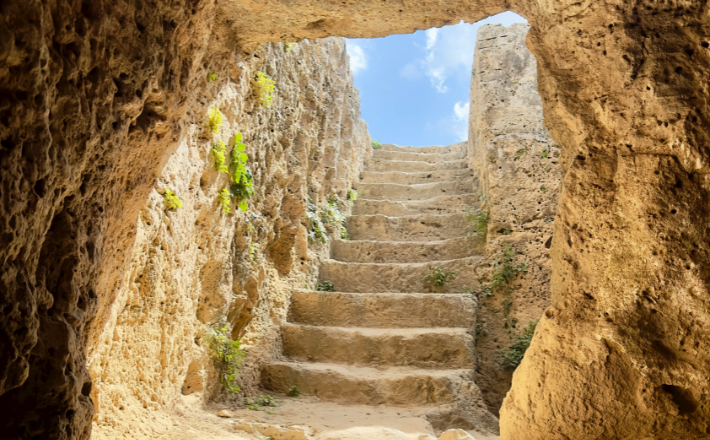Commentary on Psalm 118:1-2, 14-24
Psalm 118 is the concluding psalm in the collection known as the “Egyptian Hallel” (Psalms 113–118). Hallel is the Hebrew word for “praise,” and this collection’s name reflects the emphasis in these psalms on praising and giving thanks to God for God’s great acts of salvation.
The “Egyptian” part of the name refers to God’s deliverance of Israel from Egypt. This theme is most explicitly on display in Psalm 114, but the other psalms in the collection can also easily be read as reflecting the exodus event (for example, Psalm 113 praises God for reversing the situation of the poor, and Psalm 115 celebrates God’s superiority over idols). Traditionally, the Egyptian Hallel psalms were—and are—prayed as part of the Passover meal. When the Gospels describe how Jesus and his disciples concluded their last Passover meal by singing “the hymn” (Matthew 26:30, Mark 14:26), therefore, we can suppose they may have been singing the Egyptian Hallel. Perhaps the last song Jesus sang before his crucifixion was Psalm 118.
An overview of Psalm 118
Psalm 118 is a thanksgiving psalm that unfolds in several distinct movements:
- (verses 1–4) Call to community thanksgiving
- (verses 5–18) Story of the crisis, call for help, and rescue
- (verse 19–21) Individual thanksgiving
- (verses 22–29) Community thanksgiving
The psalmist’s declaration in verse 14 is one of the points of connection between this psalm and the exodus from Egypt that give the “Egyptian Hallel” its name. After the miraculous parting of the sea and the destruction of Pharaoh’s pursuing army, Moses and Miriam lead the Israelites in singing:
I will sing to the LORD,
for he has triumphed gloriously;
horse and rider he has thrown into the sea.
The LORD is my strength and my might,
and he has become my salvation;
this is my God, and I will praise him.” (Exodus 15:1–2)
By quoting a more ancient song of deliverance, the psalmist here connects the current moment to the past—and, by extension, to the future. As the psalmist goes on to promise to “recount the deeds of the LORD” (verse 17), worshipers recognize that these deeds include episodes of salvation from the distant past, from the psalmist’s life, and from their own experiences. Establishing patterns of divine behavior gives the community confidence in the God being worshiped. God saved in the past, and God will save again.
Having begun to celebrate the God-given victory over enemies, the psalmist appears to move toward the temple for worship. The psalmist cries out, “Open to me the gates of righteousness, that I may enter through them and give thanks to the LORD” (verse 19), and the response comes in the next verse: “This is the gate of the LORD; the righteous shall enter through it” (verse 20).
The implication of this liturgical dialogue is that we who would praise God must ensure that our lives reflect the righteousness and justice (the Hebrew word used here involves both) of God. This part of the psalm is a call to action beyond temple worship. God’s righteousness is exhibited in part through God’s help of those who are—like the psalmist was—oppressed and beaten down; God’s worshippers should be righteous in the same way.
The rest of the psalm assumes entrance into the temple is granted. The whole community joins in the praise (notice the first-person plural pronouns starting in verse 23), and the setting of this praise seems to be the precincts of the temple itself (verse 26). There are some beautiful lines of praise in this section of the psalm:
- This is the LORD’s doing; it is marvelous in our eyes. (verse 23)
- This is the day that the LORD has made; let us rejoice and be glad in it. (verse 24)
- The LORD is God, and he has given us light. (verse 27a)
The psalm ends with the same refrain with which it began. The individual’s story of how God brought salvation is the reason for the community’s worship in Psalm 118—it is the reason the psalmist calls Israel, the house of Aaron, and all who fear God to praise (verses 2–3), and the psalmist’s story of personal salvation is the reason these groups ultimately do join their voices in praise (verses 22–24). Remembering and sharing personal stories of how God has saved us in various ways is a critical part of how we worship.
Psalm 118 and the Resurrection of our Lord
This psalm puts on full display the beautiful dance between individual, community, and God. Our relationship with God is our own, but it also exists within the context of other people. In the church, this dynamic means we lament with those who lament and give thanks with those who give thanks (see Romans 12:15). Together we strive for the righteousness that characterizes those who come into the presence of the Lord.
The kind of individual and community righteousness for which Psalm 118 calls leads to disruption. Those who should have been defeated have victory, those who should be dead live, the stones that should be rejected become the most important ones. The crucified Jesus becomes the risen Lord. God is the one who makes this disruption possible—the one whose right hand does valiantly and gives victory. God is the only one who can make alive the dead.
At the same time, this psalm quietly reminds us that God has called worshipers to be agents of disruption as well. We need to pay attention to those who are calling out in distress, who are surrounded by attackers, who have no hope. We need to recount the deeds of the Lord in past acts of salvation, but we also need to stand ready to offer what salvation we can in the moment. God calls us to worship—by helping bring people out of distress, delivering them from attackers, and giving them the hope of Easter.


March 31, 2024